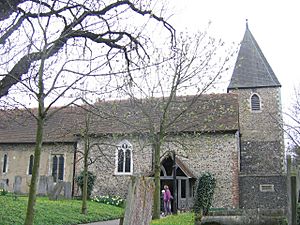Church of St Margaret of Antioch, Darenth facts for kids
Quick facts for kids Church of St Margaret of Antioch, Darenth |
|
|---|---|

St Margaret of Antioch
|
|
| 51°25′08″N 0°14′36″E / 51.4190°N 0.2433°E | |
| Location | Darenth, Kent |
| Country | England |
| Denomination | Church of England |
| Website | [1] |
| History | |
| Status | Grade I listed |
| Architecture | |
| Years built | 10th–14th centuries, with 19th-century restorations |
| Administration | |
| Diocese | Rochester |
The Church of St Margaret of Antioch in Darenth, Kent, is a very old and special church. It has Norman beginnings and is believed to be one of the oldest churches in Kent. It is also thought to be one of the oldest churches in the entire United Kingdom. This church is so important that it is officially recognized as a Grade I listed building. This means it has a lot of historical and architectural value.
Contents
A Look at the Church's History
The Church of St Margaret of Antioch has a long and interesting past. Parts of the church, like the main body (called the nave) and the area around the altar (called the chancel), were built a very long time ago. They date back to the late 10th century or early 11th century.
How the Church Grew Over Time
Later, in the early 12th century, another part of the church was added. This was the sanctuary, which is the area around the main altar. This shows how the church slowly grew and changed over hundreds of years. Each part tells a story about different times in history.
Restoring the Old Church
Over the centuries, buildings need care and sometimes repairs. The Church of St Margaret of Antioch was restored twice in the 19th century. The first restoration happened between 1866 and 1868. This work was led by an architect named William Burges. Later, in 1888, another architect named Ewan Christian also worked on restoring the church. These restorations helped to keep the old church strong and beautiful for future generations.
What is a Grade I Listed Building?
The Church of St Margaret of Antioch is a Grade I listed building. This is a very special status in England. It means the building is considered to be of exceptional historical or architectural interest. Only about 2.5% of all listed buildings have this Grade I status. It helps protect these important places so they can be enjoyed and studied for many years to come.

